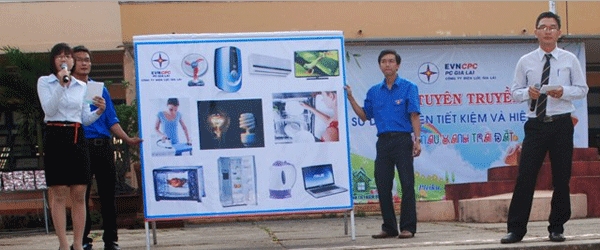Tuesday, 03/03/2026 | 16:17 GMT+7
Electricity saving in 2014 is 17,491,760 kWh compared with the same period of previous year for the whole province, equivalent to VND29.04 billion, accounting for 2.17% of commercial power production in the province.
Electricity saving for the first 10 months of 2015 is 15.232.680kWh compared with the same period of previous year for the whole province, equivalent to VND28.55 billion, and accounting for 2.18% of commercial power production in the province.
To achieve such results, it is attributed to the interest of the central, provincial and agencies and units in the province. Recently, the Provincial Department of Industry and Trade, and Gia Lai Power Company have been striving with possible efforts in public communication on power savings through various measures such as:
Leaflets handouts, hanging banners, gonfalons bearing communication messages are on displayed in schools, streets in districts, towns and cities to guide people how to use electricity safely and economically; tests are also organized for students, participation in the public communication, "Earth hour campaign". Advocacy and support are extended to the people, businesses for replacement of incandescent bulbs with LEDs, compact fluorescent lights. Therefore, the campaign helps improve the efficiency in the work of saving electricity in the province.

Gia Lai Electricity with public communication on power saving
Besides, the implementation of energy saving in the province is facing a number of difficulties: A majority of people do not understand the importance of saving electricity; For the manufacturing industry: power-saving practice only focuses on some auxiliary equipment.
The technological production line of the majority of plants is backward and it does not meet the standards for energy labeling of Ministry of Industry and Trade; Payrolls for specialized staff are slim causing more difficulties in implementing work; Currently, the evaluation of the energy savings for other types of energy such as coal, gas, oil has no basis for evaluation, so it is also difficult.
Therefore, in order to facilitate the implementation of energy-saving in the province, Ministry of Industry and Trade should enact regulations on energy consumption rate per unit of product; promulgate the regulations on the assessment of energy savings for other types of energy for local-based deployment.
Trong Tan







